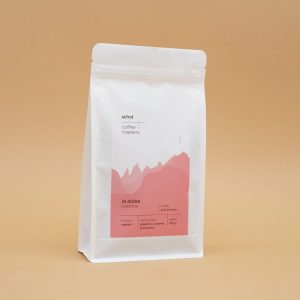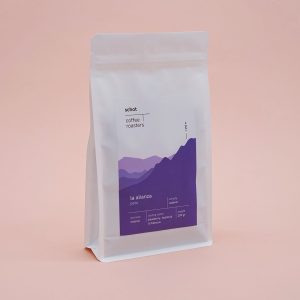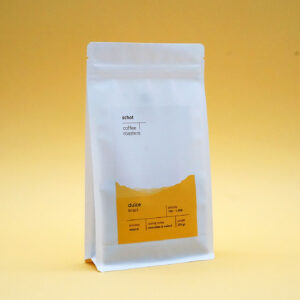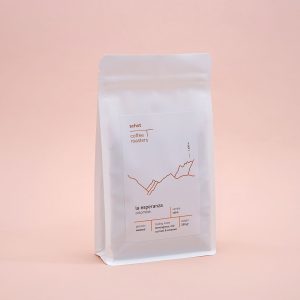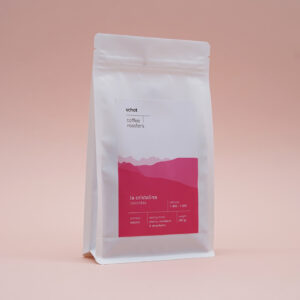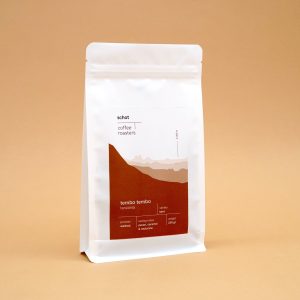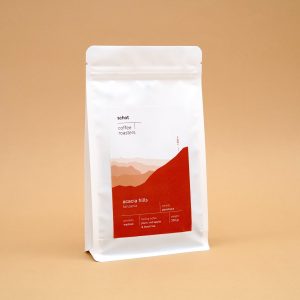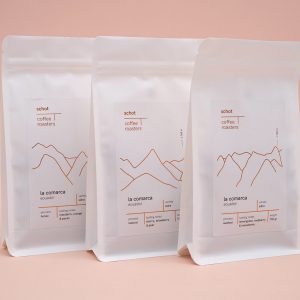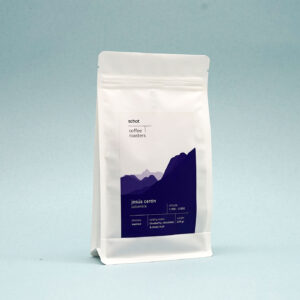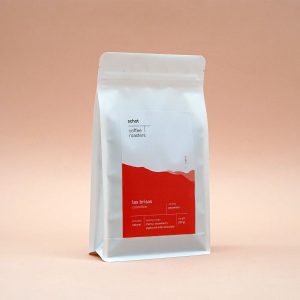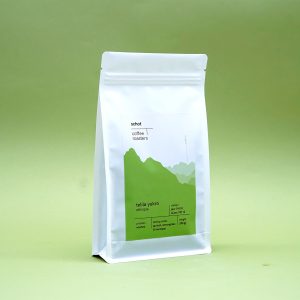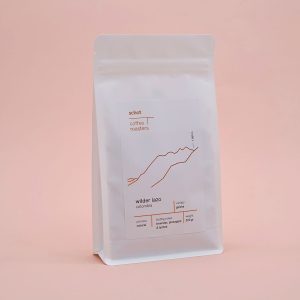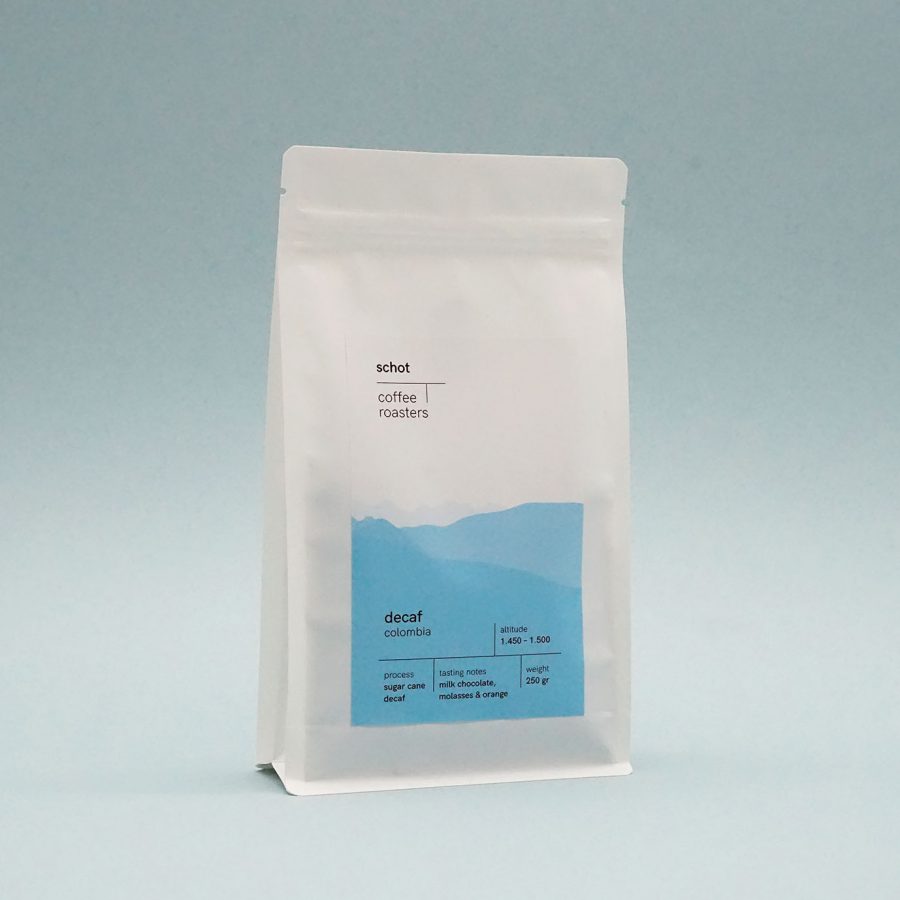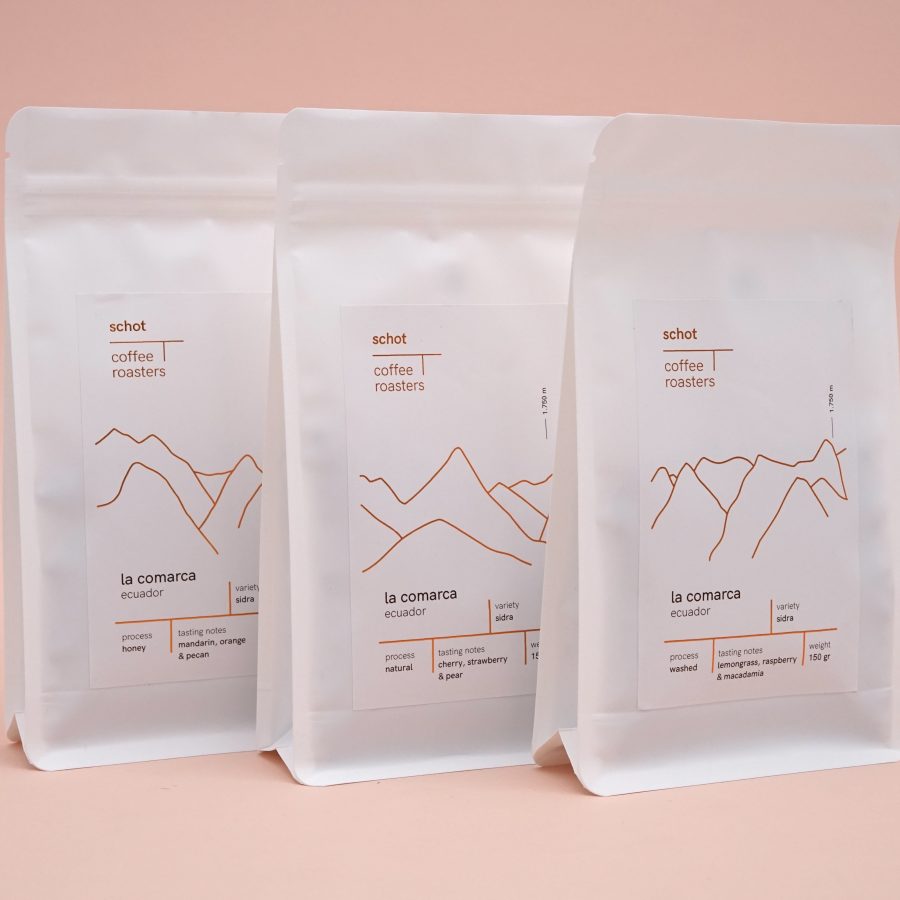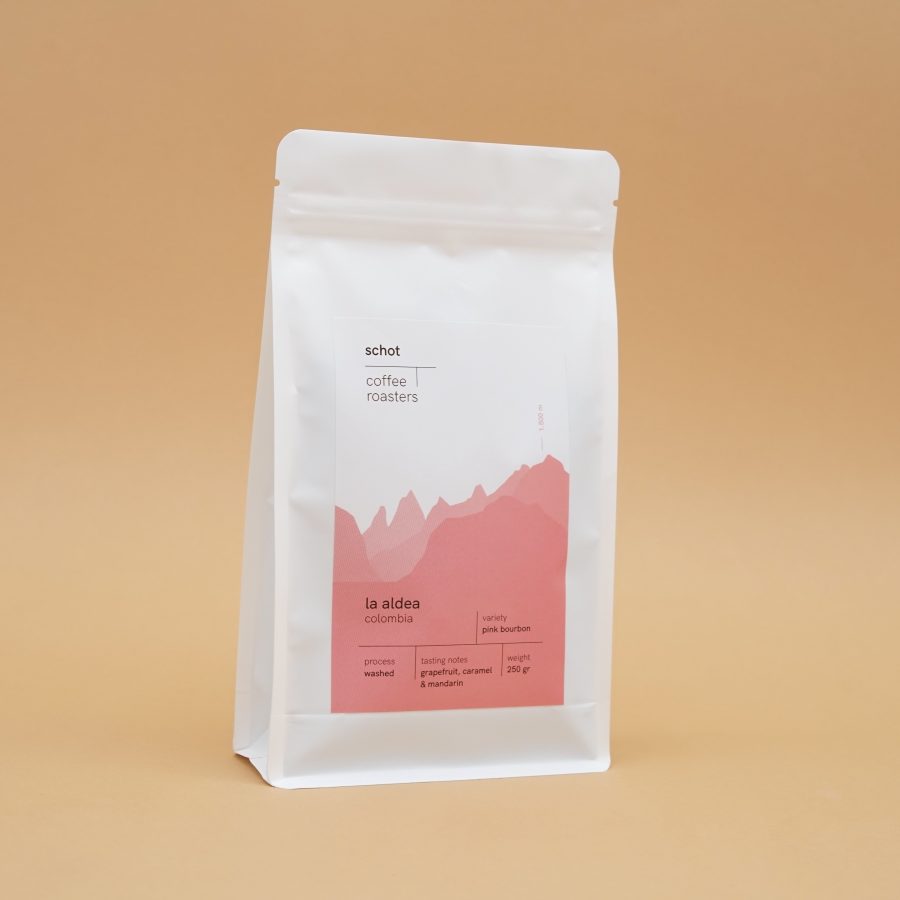For all coffees we buy we have an extensive description with background information about the farm or partner where the coffee is sourced.
We roast several times a week and keep limited stock of roasted coffee to guarantee freshness.
Our coffees
Coffee can be stored for years, however, the best results are achieved between about two and eight weeks after roasting. That’s why we don’t mention an expiry date, but a roasting date on the bottom of our bags.
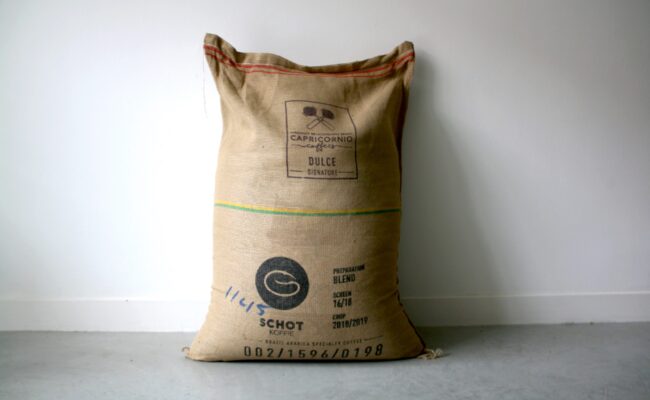
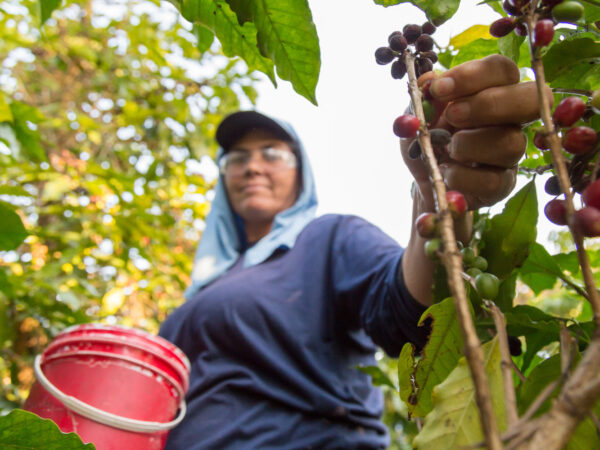
Brazil Dulce
Quality and consistency. It’s not easy when you’re a farmer, with changing weather and different circumstances on a yearly or even seasonal basis, to match the exact same flavor profile as last year. It might even be impossible. For this reason, the team of Q-graders of Capricornio Coffees cup all the coffees of the more than a dozen partner fazendas and farmer groups, grade them according to their flavor and quality, and then make farmer blends, solely based on taste. For example, the Dulce Signature blend is described as dark chocolate, with a sweet and round thick body. One year, this might consist of more coffee from Fazenda Terra Preta and less from Sítio Teixeira. The year after, this might be the other way around.
Farm composition in the coffee bag might change, but the farms don’t sit still themselves either. Being part of Capricornio’s 4 Seasons Project, they get free agronomical support, with an agronomist visiting them every 60 days. Together, they look at plant and soil health and do soil measurements, that are used to advice on which parts of the farms need extra attention. It’s high-end knowledge and solid partnership to provide a sustainable future.
Since 2017, we have been working with the Dulce blend and they have since proven to be the stable factor for many cafe’s. It comes with its own traceability report, so we know in detail which farms contributed to which blend, year after year.
The cup profile gives us everything we want in a good Brazilian coffee: good body and sweetness, mild acidity and heavy chocolate and nutty flavours without any fruit notes. A true crowd pleaser.
Region
Plantation
Altitude
– 900
Plant variety
Yellow Catuaí, Mundo Novo, Obatã.
Process
Pulped natural
Tasting notes
Walnut & chocolate
Curious about this coffee?
-
Brazil Dulce
Select options This product has multiple variants. The options may be chosen on the product page€8,00 – €27,50
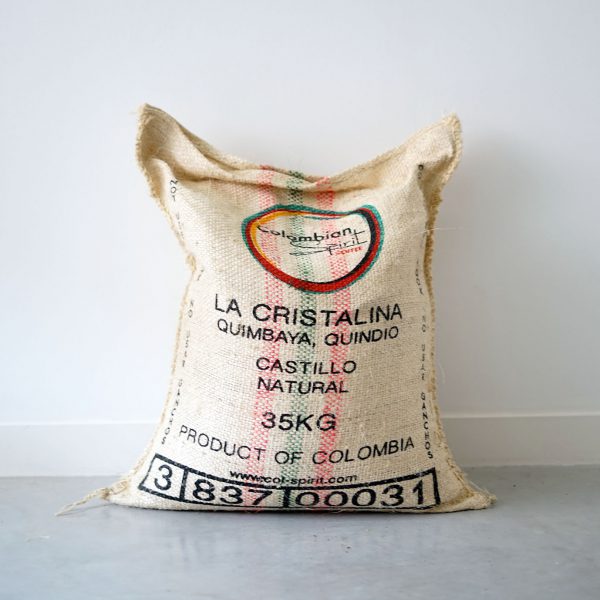

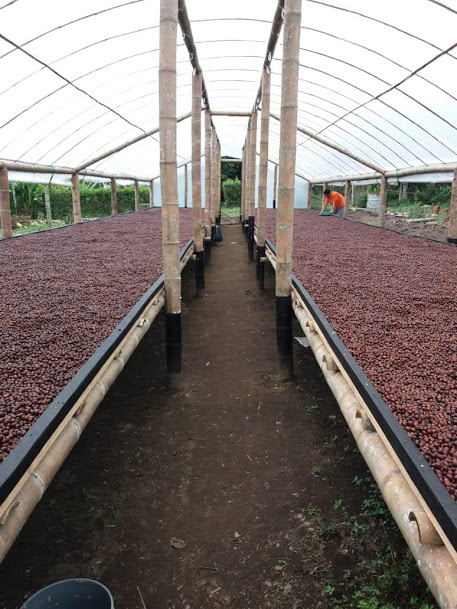
Colombia la Cristalina
The La Cristalina plantation is located near Quimbaya in the Quindo department. The plantation has been owned by the Grajales for over 100 years. Maria Mercedes Grajales is now the 5th generation at the helm of La Cristalina. The total plantation is approximately 19 hectares, of which 14 hectares are planted with coffee. about 5 hectares of the plantation are planted with other trees such as orange, ‘platano’ and ‘cafatero’. The majority of the plants on the Cristalina plantation are of the Castillo variety.
Natural lot
The pickers are encouraged to pick the coffee at its optimal maturity. For that selective picking process La Cristalina works with the long-term pickers that get paid far more than normal. Most pickers come to this farm for 10+ years.
After picking the cherries are floated intensively to remove the less dense and defected cherries.
The coffee is placed on “carros corredizos” and drying tunnels with direct sun exposure for the first 48 hours. After the humidity is down to about 40% it is placed in GrainPro for 36 hours to create its fruity punch in its cup. During fermentation the temperature and PH is monitored and documented every 3 hours. After fermentation the coffee goes back to the drying beds where it is also moved every 3 hours. The total process takes around 15 days, depending on the weather.
The coffee is very fragrant and expressive, with flavours of cherry, mandarin and strawberry.
Decaf lot
The La Cristalina coffee is decaffeinated by means of ‘Sugar Cane’. A characteristic of this decaf process is that the coffee retains many of its aromas. In addition, it often produces a very sweet coffee. The result is a sweet coffee with flavor of orange molasses and milk chocolate.
Region
Plantation
Process
Tasting notes
Milk chocolate, molasses & orange
Curious about this coffee?
-
Colombia Decaf
Select options This product has multiple variants. The options may be chosen on the product page€9,00 – €29,50
Region
Plantation
Process
Tasting notes
Cherry, mandarin & strawberry
Curious about this coffee?
-
Colombia La Cristalina
Select options This product has multiple variants. The options may be chosen on the product page€13,50 – €39,50
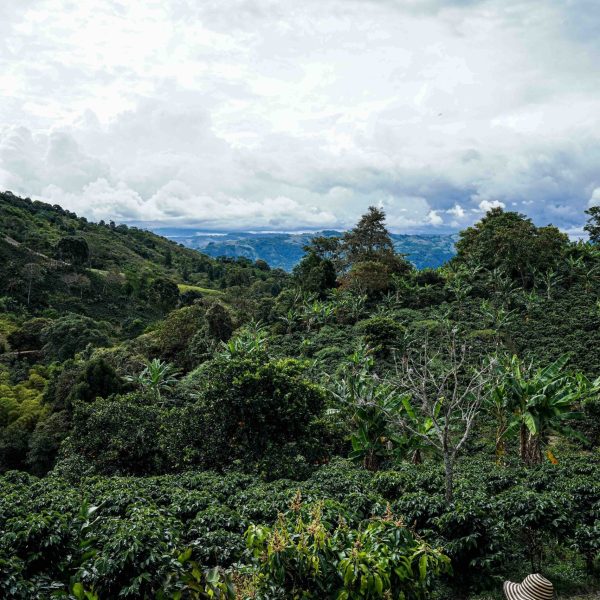
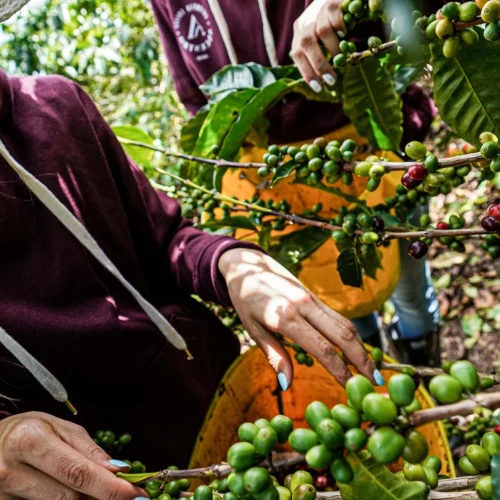

Colombia Las Brisas
Their coffee business has a rich and storied tradition that started with their great-grandfather, Carlos Enrique Rivera, who grew coffee with passion and dedication near the Mesa de Elías Huila in Colombia.
His coffee beans were renowned for their quality and sold to Colombian families. As the representative of the south of Huila of the National Federation of Coffee Growers of Colombia (FNC), he not only improved the quality of growers, but also shared his knowledge about coffee production. He not only produced high-quality coffee but also shared his knowledge with growers. His legacy continues to inspire the family to this day and they remain committed to giving back to the community and supporting important projects for the municipality.
We’re very excited to share this natural processed Pacamara variety with you. Las Brisas is about 15 acres and lies at an altitude of 1.400-1.500 meter above sea level They grow castillo, caturra, geisha, pink bourbon and pacamara. We’re very excited to share this natural processed Pacamara variety with you. On the cupping table this coffee stood out for its clear, clean and expressive red fruit (cherry, strawberry) flavours.
It’s a great filter coffee, but will also brew an impressive espresso once you find the sweet spot.
Region
Plantation
Process
Tasting notes
Cherry, strawberry yoghurt & milk chocolate
Curious about this coffee?
-
Colombia Las Brisas
Select options This product has multiple variants. The options may be chosen on the product page€16,50 – €54,50
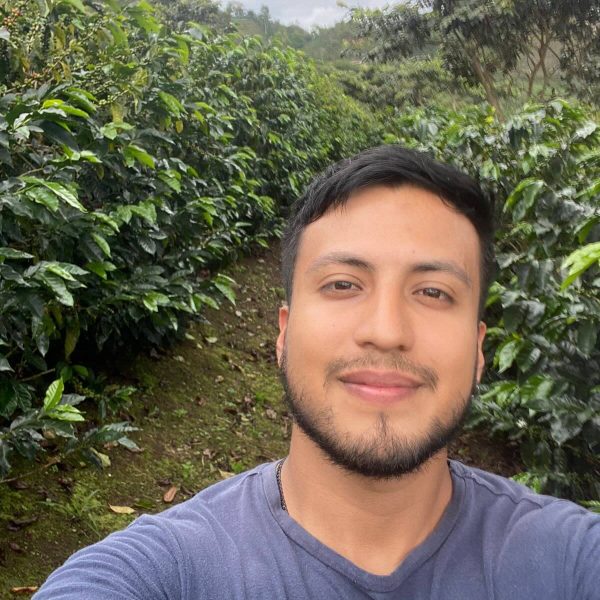
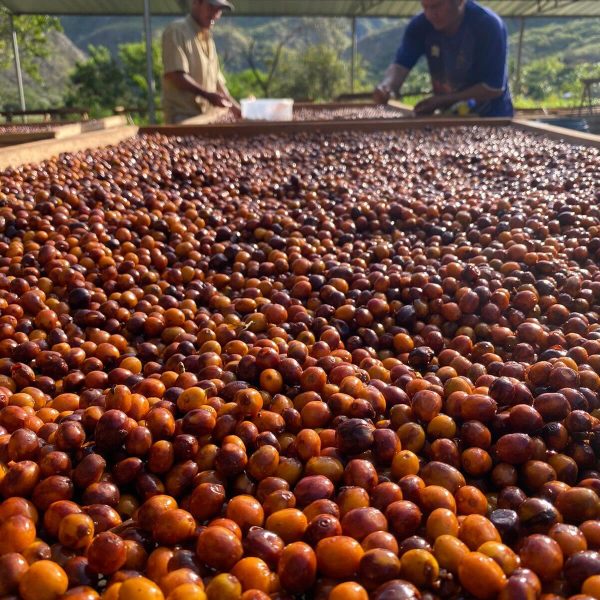
Peru La Alianza Natural
Our first ever natural coffee from Peru is from La Alianza. This farm was introduced to us by Clara at the Amsterdam Coffee Festival. The farm is located at 1.930 meters above sea level in the North of Peru in Huabal in the well know Cajamarca region. Most coffee in Peru is grown in this region.
Saulo Díaz and his family take care of it, nurturing the beans with dedication. atimor variety was introduced in the ’70s in Africa, mainly for its high yield and resistance to both coffee leaf rust and coffee berry disease. The processing of this Catimor lot involved drying the coffee for approximately 20 days in shade on raised beds made with Guayaquil wood and reeds. Prior to the drying process, the coffee was fermented for 50 hours in sealed tanks (timbres) and in enclosed rooms with controlled temperatures.
Super sweet and thick coffee with flavours of blueberry, hazelnut and hibiscus.
Very good coffee for espresso and milk based drinks.
Region
Jean, Cajamarca
Plantation
La Alianza
Altitude
2.000
Plant variety
Catimor
Process
Natural
Tasting notes
Blueberry, hazelnut & hibiscus
Curious about this coffee?
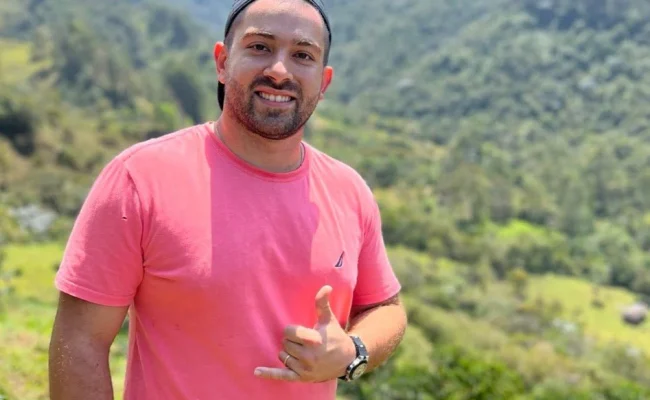
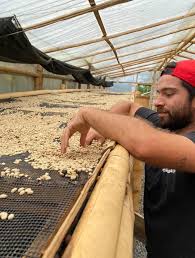
Colombia La Esperanza Sidra
This is our first coffee from Cafe 1959. Located in the South of the Huila region, this coffee grows in the 1.750 MASL. As part of a program in Cafe1959 that processes cherries from different farmers. They partner with some of the best producers of the region in order to create amazing coffees.
The Sidra cherries were collected and put into Grainpro Bags in order to start the 13 hour trip from Huila to Quindio (where the 1959 fermentation and drying facility is located). Transported in a refrigerated truck, they maintain precise temperature control during the initial fermentation stage inside the truck. After arriving in Quindio the cherries complete a 24hr pre fermentation.
The cherries are then pulped and put into closed tanks in order to have other 24hr anaerobic fermentation. After this the tank is opened, the coffee is lightly washed and put into a dry closed tank for another 24 hr fermentation. After the 24hr fermentation the coffee is washed again.
Following these meticulous fermentation steps, the coffee is subjected to a lengthy and gradual drying process, typically lasting 40 days under shade. It is then meticulously prepared for milling, hand-sorted, vacuum-packaged, and dispatched to ensure the highest quality.
The end result is a very layered and complex cup of coffee.
Region
Plantation
Altitude
Plant variety
Sidra
Process
Double washed
Tasting notes
Lemongrass, red currant & caramel
Curious about this coffee?
-
Colombia La Esperanza Sidra
Select options This product has multiple variants. The options may be chosen on the product page€21,49

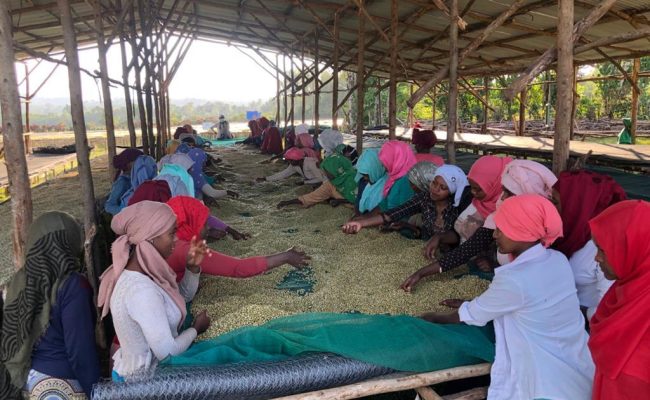
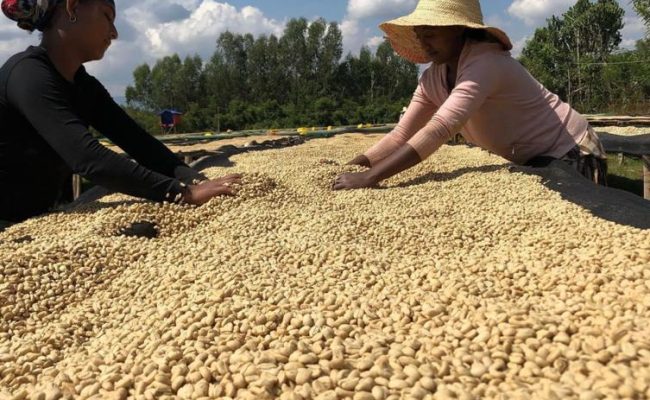
Ethiopia Telila Yukro
This coffee is cultivated in the Western part of Ethiopia near the forests that are the birthplace of Arabica coffee. Limu and Djimma, another popular coffee producing region, overlap. The region shares many characteristics with the Southern regions, especially Yirgacheffe and Sidamo, coffees from the three regions also share the floral notes and citric acidity. Limu is known for having a fuller body than the other two regions.
Telila is a newer washing station in western Ethiopia. It is owned and operated by Mike Mamo of Addis Exporters. This particular mill – Telila Washing Station – is situated near Kecho Anderacha in Gera woreda. the washing station is owned by Mike Mamo. Mike is a coffee exporter and also partner in the importer for this coffee, but in 2019 he decided to buy this Washing Station.
Like most Washing Stations in Ethiopia, Telila takes coffee cherries from local smallholders. Unlike many Washing Stations, Mike has focused on controlling and separating the coffee cherries the mill takes in lots can be kept apart. That’s where the second part of this coffee’s name comes in – this lot has come from one day’s worth of coffee processed from the nearby Yukro village.
Region
Yukro, Limmu
Plantation
Telila CWS
Altitude
Plant variety
JARC74110 & JARC74112
Process
Tasting notes
Apricot, lemongrass & marzipan
Curious about this coffee?
-
Ethiopia Telila Yukro
Select options This product has multiple variants. The options may be chosen on the product page€12,50 – €36,50
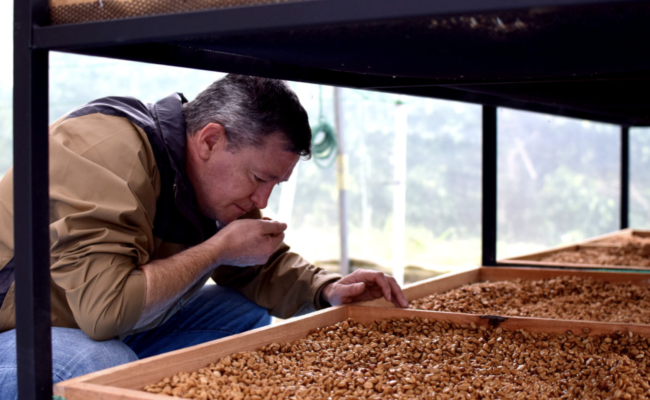
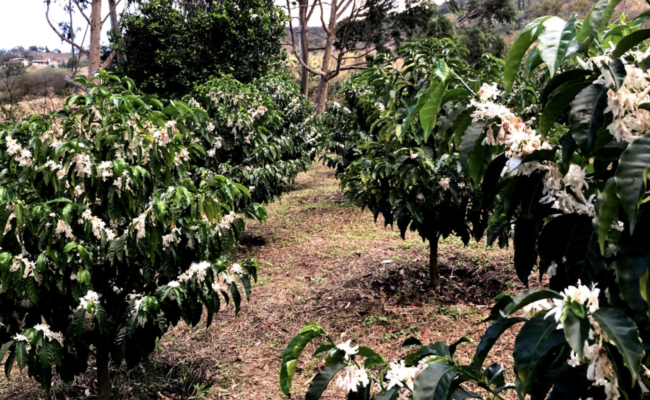
Ecuador La Comarca Sidra
La Comarca is a family farm established almost 100 years ago for the production of beef and cow milk. The ranch was also used for the production of coffee, sugar cane, citrus and other fruits. Over the years, it began to close its operation due to migration of people from the countryside to the city. Now a new generation family members started to revamp the farm by producing specialty coffee. The farm is located at 1.600 meters above sea level in a Valley called Malacatos on a 20 minutes drive from downtown Loja.
Weather ranges from heavy rain to very dry depending on the season, becoming a big challenge to keep coffee beans in optimum condition. Despite these challenging circumstances, Daniel and his family achieve to deliver sweet, clean and expressive coffees.
This is the second year we’re working with La Comarca and we got the opportunity to buy a washed, honey and natural processed lot from this farm. We decided to bundle the coffees and present them all in a processing box.
The Bourbon Sidra cultivar was developed on a large research farm in Ecuador through funding from Nestlé. This variety was created by manually crossing Red Bourbon and Ethiopian heirloom varieties which carried Typica lineage. Unlike many modern hybrids, Sidra was developed with the sole aim of creating a high quality cup profile, highlighting both the heavy sweetness of Bourbon and the delicate florals that Typica is well-known for. In exchange for feedback, Nestlé offered the variety to farmers in the region, leading to a surge in its cultivation in Ecuador.
This box is a great way to gain more knowledge and understanding on how processing impacts the flavour of coffee. The box comes with info cards on the coffees.
Region
Vilcabamba, Loja
Plantation
La Comarca
Altitude
Plant variety
Process
Tasting notes
washed: lemongrass, raspberry & macademia
honey: mandarin, orange & pecan
natural: strawberry, cherry & pear
Curious about this coffee?

Colombia Wilder Lazo Sidra
Because of his passion for coffee and family history in coffee production, Wilder entered the coffee world in a unique way. He started not only with specialty coffee right away, but with his background in genetics, and also his relentless energy of learning, he began a varietal program in Tocora. Nowadays this program includes more than 12 different varieties, which have been carefully selected from different origins.
Wilder Lazo’s family is made up of a group of passionate coffee producers in San Adolfo (Huila). Throughout the years, they have faced many challenges to achieve their dreams. After a devastating fire, they left their farm, but because of father’s determination, they came back to rebuild their crops and the entire farm.
The whole family is involved in coffee production. Mum finds joy, gardening, while kids specialise in different aspects of the business from drying, processing and commercialization. They turn their farm into a platform for specialty coffee, with exceptional and exquisite flavours and aromas. Despite the hard times they never gave up. Their dedication and passion have allowed them to provide a way of living and education for their children’s better future. Now the entire family continue this legacy, making sure Wilder Lazo’s coffee is distinguished among many strict palates.
Wilder Lazo’s history it’s a reminder of the importance of perseverance and working hard with love. His farm is a charming place where they cultivate specialty coffee. Being that the result of an entire family effort and passion.
Wilder is a well of knowledge when it comes to genetics and processes. He focuses on bringing out the true characteristics of each varietal with fermentations and post-harvest processes that only highlight the varietal’s own attributes. Wilder recently joined the El Placer Farms Project, because he is a close friend of Sebastian Ramirez and he wanted to have a more direct contact with the people who roast and drink their coffee.
We were blown away by this Geisha when it passed by on the cupping table. This coffee is super expressive without any overfermented flavours. It very rich and complex, full of lavender and tropical fruit flavours.
Region
Plantation
Bella Alejandria
Altitude
Plant variety
Process
Tasting notes
Lavender, pineapple & lychee
Curious about this coffee?
-
Colombia Wilder Lazo Geisha
Select options This product has multiple variants. The options may be chosen on the product page€21,49
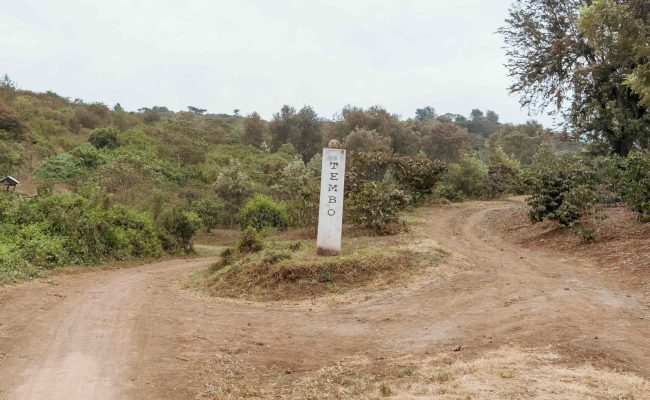


Tanzania Tembo Tembo
German settlers first planted coffee on Tembo Tembo estate in the 1920s. Today, the estate is owned and operated by Gaétan and Caroline Bordier, a Swiss couple.
As with neighboring Acacia Hills Estate, the view from Tembo Tembo Estate is surreal. From the Northern edges of the farm, you can see the edge of Ngorogoro crater, an ancient collapsed volcano whose fertile valley is now home to dozens of different animal species: from African elephants to lions, rhinoceros and leopards and giraffes. The northern border of the estate lies along the Southwestern side of Mount Oldeani, whose slopes drain water into Lake Eyasi, a key saltwater lake on the borders of Ngorogoro Conservation area and Serengeti National Park.
Gaétan and Caroline began renovating the farm in 2009. In addition to implementing modern cultivation techniques to help increase the quality of their coffee, they also planted Geisha and Pacamara seedlings, two varieties renown for producing quality coffee and high cup scores.
Gaétan and Caroline believe that the next steps towards quality improvement lie in the small details and are focused on improving post-harvest control, especially moisture content, in order to increase coffee quality.
The variety of this lot is Kent. Kent is quite common in Africa and is very resistant to pests such as rust and produces a smooth and balanced cup of coffee. Cherry is selectively handpicked and delivered to the farm’s onsite wet mill. Cherry is pulped on an Ecopulper and dry fermented. Following fermentation, parchment is washed in clean water and then laid to dry on African raised beds for 8-10 days. Parchment is turned regularly to ensure even drying. Traditionally, the estate dries parchment directly in the sun. Parchment rests on the farm for 1-2 months in lined, airtight bags stored on wooden pallets.
Region
Oldeani, Karatu
Plantation
Tembo Tembo
Altitude
Plant variety
Process
Tasting notes
Pecan, caramel & apricot
Curious about this coffee?
-
Tanzania Tembo Tembo
Select options This product has multiple variants. The options may be chosen on the product page€9,50 – €29,50
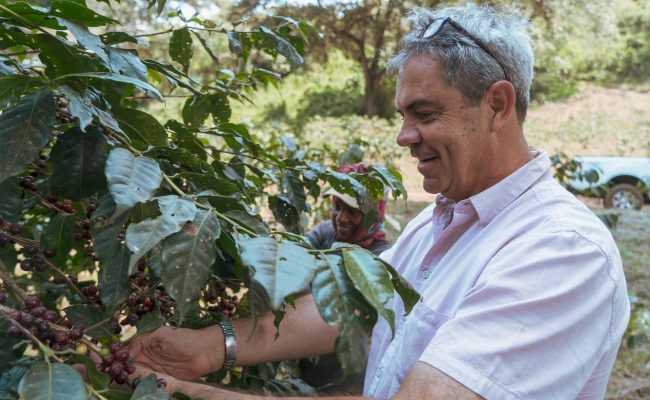


Tanzania Acacia Hills Pacamara
The history of coffee in northern Tanzania begins in the 19th century. Coffee trees were brought to northern Tanzania from Reunion Island near Madagascar and immigrants from Germany, the occupying country at the time, developed it into an industry. Most of the coffee plantations here in northern Tanzania seem to have been established around the 1920s after World War I.
Leon’s grandparents were also immigrants who came to Tanzania from Greece around the early 1900s and made a living from coffee production. Leon is the third generation of the family. The family’s house is located on the outskirts of Arusha, near the Kilimanjaro International Airport. His grandfather and father mostly grew coffee in its surrounding plantations, but the land was not suitable for producing high quality coffee due to its low altitude.
Leon learned about the concept of specialty coffee in the 2000s and started looking for lands in high altitude that could produce higher quality coffee. It was around this time that Leon met his current business partner, Mark Stell. Mark is the founder of Portland Coffee Roasters in the US. Leon and Mark hit it off, and in 2007 they jointly purchased a coffee plantation on Mount Oldeani, which is now known as Acacia Hills.
This washed Pacamara is no
Region
Oldeani, Karatu
Plantation
Acacia Hills
Altitude
Plant variety
Process
Tasting notes
Plum, red apple & black tea
Curious about this coffee?
-
Tanzania Acacia Hills Pacamara
Select options This product has multiple variants. The options may be chosen on the product page€16,50 – €54,50


Colombia La Aldea Pink Bourbon
Wilson is a 35 year old coffee farmer in the third generation. His farm, La Aldea, consists of 16 hectares owned by his family members, divided into coffee crops and native mountains.
His active life as coffee farmer and processer began approximately 8 years ago when he returned to the region after being outside the farm advancing his studies in agricultural education and technification in specialty coffee crops.
Wilson had the opportunity to acquire a small part of that farm as an inheritance from his parents, consisting of 5 hectares in coffee of different varieties: Pink Bourbon, Typica, Caturra, Tabi and Geisha.
Then in the year 2021 a family alliance has been made to form the different family lots into a single farm and new crops have been planted from existing seeds that were of excellent quality and adaptation of the soil.
This Pink Bourbon lot underwent a double fermentation; first a 48 hours pre fermentation in cherry and then after pulping a 60 hours fermentation in tanks. The results is a clean and balanced coffee with flavours of grapefruit, caramel and mandarin and some floral notes.
Region
San Agustin, Huila
Plantation
La Aldea
Altitude
Plant variety
Process
Tasting notes
Grapefruit, caramel & mandarin
Curious about this coffee?
-
Colombia La Aldea Pink Bourbon
Select options This product has multiple variants. The options may be chosen on the product page€14,50 – €46,50
